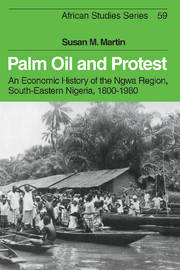Book contents
- Frontmatter
- Contents
- List of maps and figure
- Acknowledgements
- Abbreviations
- 1 Introduction
- 2 Ecology, society and economic change to 1891
- 3 The Ngwa and colonial rule, 1891–1914
- 4 The expansion of the oil palm industry, 1884–1914
- 5 The end of the boom
- 6 Cassava and Christianity
- 7 Authority, justice and property rights
- 8 Trade, credit and mobility
- 9 Production and protest: the Women Riot, 1929
- 10 Cash cropping and economic change, 1930–80
- 11 Conclusion
- Statistical appendix
- Notes
- Interviews conducted in the Ngwa region, 1980–1
- Bibliography
- Index
8 - Trade, credit and mobility
Published online by Cambridge University Press: 11 September 2009
- Frontmatter
- Contents
- List of maps and figure
- Acknowledgements
- Abbreviations
- 1 Introduction
- 2 Ecology, society and economic change to 1891
- 3 The Ngwa and colonial rule, 1891–1914
- 4 The expansion of the oil palm industry, 1884–1914
- 5 The end of the boom
- 6 Cassava and Christianity
- 7 Authority, justice and property rights
- 8 Trade, credit and mobility
- 9 Production and protest: the Women Riot, 1929
- 10 Cash cropping and economic change, 1930–80
- 11 Conclusion
- Statistical appendix
- Notes
- Interviews conducted in the Ngwa region, 1980–1
- Bibliography
- Index
Summary
Despite the low real price levels of palm produce during the inter-war period, exports from eastern Nigeria continued to increase. The volume of palm oil and kernels exported in 1935–9 was almost two and a half times the level of 1909–13. In the following two chapters, we will examine the role of the oil palm industry in the lives of the main producers: women and junior men. It will be shown that while colonial transport innovations provided junior men with fresh opportunities to travel and enter into trade, women remained tied to their homes and families, both in their daily lives and in their loyalties. In this chapter, we will follow the fortunes of junior men. An initial discussion of the transport innovations which paved the way for change will be followed by a survey of the trade and credit structures of the inter-war period, within which aspiring Ngwa middlemen played a growing, but still subsidiary role. A number of individual life stories will then be related to illustrate the range of opportunities which junior men were able to take up, and the way in which they used the limited profits which they were able to make from palm production and petty trade before the Second World War.
The Ngwa differed from their Southern Igbo and Ibibio neighbours in that they did not get heavily involved in the agricultural labour migrations which became important in many regions of Nigeria during the inter-war period.
- Type
- Chapter
- Information
- Palm Oil and ProtestAn Economic History of the Ngwa Region, South-Eastern Nigeria, 1800–1980, pp. 90 - 105Publisher: Cambridge University PressPrint publication year: 1988



